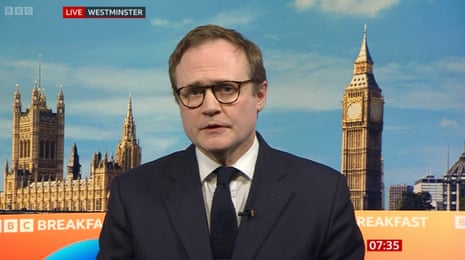Tugendhat rejects suggestion that government exploiting extremism threat for political advantage – UK politics live
Good morning. This week the government is due to issue a new official definition of extremism, and it comes after Rishi Sunak has been talking up the threat, which he has partly linked to to the pro-Palestinian marches that have been taking place since the outreak of the Israel-Hamas war. Two weeks ago, in a briefing to police officers, Sunak said: “There is a growing consensus that mob rule is replacing democratic rule.” Then, in a surprise Friday night speech outside No 10, he said that extremist groups were “trying to tear us apart”. Later this week Michael Gove is expected to publish a new definition saying “core behaviours” that could constitute extremism include attempts to “overturn, exploit or undermine the UK’s system of liberal democracy to confer advantages or disadvantages on specific groups”.
While there is no doubt at at that events in the Middle East have triggered a huge increase in reported incidents of antisemitism and Islamophobia, some of the government’s response has been criticised as alarmist, or even hypocritical. This is a message posted by Charlie Falconer, the former Labour lord chancellor, on X, last night.
Gove definition of extremism includes: “attempts to overturn.. or undermine UK system of liberal democracy to confer..disadvantages on specific groups.” Lib democracy includes rule of law. Rwanda Bill undermines rule of law to disadvantage asylum seekers. https://t.co/3QGf6rsofa
— Charlie Falconer (@LordCFalconer) March 10, 2024
Falconer was commenting on a Guardian story by Kiran Stacey saying that three Conservative home secretaries, Priti Patel, Sajid Javid and Amber Rudd, are among a group of experts in this field who have signed an open letter saying that the government should be building a political consensus on this issue and “it’s particularly important that that consensus is maintained and that no political party uses the issue to seek short term tactical advantage”. It does not directly accuses the government of politicising the issue, but the authors of the letter clearly fear this is a risk, and their intervention follows the row triggered by Lee Anderson, the former Tory deputy chair, claiming that Sadiq Khan, the Labour London mayor, was under the control of Islamists.
Javid and Rudd were both relatively liberal home secretaries (at least, in Tory terms), but Patel was, and is, a rightwing hardliner. Any Tory minister whose crackdown on extremism is deemed by her to be going a bit too far would be wise to consider that perhaps it is.
Here is Kiran’s story.
Tom Tugendhat, the security minister, was on the media round. Asked about the letter signed by Patel, Javid, Rudd and others, he said they were “absolutely right” to say that the government should not be using this issue for party political advantage. He went on:
I don’t think we should, and I don’t think we are.
When it was put to Tugendhat that Sunk’s claim that the UK was becoming subject to “mob rule” was not helpful, he declined to defend it. “We all speak in our own way about various different issues,” he said. But he defended what the PM said in his speech in Downing Street (which did not repeat the “mob rule” claim). Tudgendhat said:
I think the prime minister set out on the steps of Downing Street a very, very clear – and, I would argue, very inclusive – agenda on keeping British people safe. He made the point, and I think it’s the correct one to make, that extremism in this country sadly has resumed. We must take action to confront it.
Here is the agenda for the day.
Morning: Rishi Sunak is doing a visit.
Morning: Keir Starmer is visiting a school in Essex with Bridget Phillipson, the shadow education secretary.
10.30am: Richard Tice, the Reform UK leader, holds a press conference.
11.30am: Downing Street holds a lobby briefing.
12.30pm: Former prime ministers Sir John Major and Gordon Brown speak at the launch of the Institute for Government’s “Fixing the Centre of Government” report.
2.30pm: Gillian Keegan, the education secretary, takes questions in the Commons.
If you want to contact me, do try the “send us a message” feature. You’ll see it just below the byline – on the left of the screen, if you are reading on a laptop or a desktop. This is for people who want to message me directly. I find it very useful when people message to point out errors (even typos – no mistake is too small to correct). Often I find your questions very interesting, too. I can’t promise to reply to them all, but I will try to reply to as many as I can, either in the comments below the line; privately (if you leave an email address and that seems more appropriate); or in the main blog, if I think it is a topic of wide interest.
